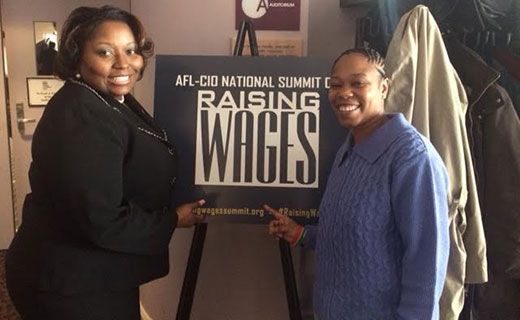
WASHINGTON – Many of the people gathering here this morning at the first-ever AFL-CIO National Summit on Raising Wages didn’t have an easy time getting here.
The workers who are part of this event had to take off from their jobs and leave their homes which, in some cases, are thousands of miles away.
Among them are bank tellers who count money all day long but at the end of the day have not a single dollar they can deposit into their own bank accounts, and construction workers who build houses all day long but are themselves homeless.
Lakia Wilson, a school counselor from the Detroit public schools and a member of the Detroit Federation of Teachers, stayed in a downtown hotel last night and rode in a van to the conference here this morning. People’s World interviewed her during the ride from the hotel to the summit this morning.
Wilson, who has a master’s degree, said, “that degree is not very meaningful if you can’t pay your basic bills. I love my job but it should pay a decent wage. Thank God when I see my kids in the morning, smiling at me and saying ‘good morning Miss Walker,’ it melts away some of that bitterness.”
Wilson said she made the trip because there is a simple solution to the problem of inequality in America. “Just raise people’s wages!” she declared.
Sitting next to Wilson in the van was Shantel Walker who works at a Papa John’s pizza place in Brooklyn.
Walker, who has worked for the company for eight years, earns $8.50 per hour.
When asked what she does on the job she said, “Just about everything. I make the pizzas, I’m an expert at spinning the dough, I answer the phones. We’ve been able to make our store a million dollar store.”
“It’s not just me,” she said. “I’m here because we have to raise wages for everyone in this country.”
There is plenty of evidence here today that concern about raising wages in America goes well beyond just the low paid workers themselves.
“Low wage Americans are not the only workers affected by stagnant wages and rising inequality,” said Lawrence Mishel, president of the Economic Policy Institute. “The middle class has also experienced stagnating hourly wages over the last generation, and even those with college degrees have seen no pay growth over the last 10 years. Since the late 1970s, wages for the bottom 70 percent of earners have been essentially stagnant, and between 2009 and 2013, real wages fell for the entire bottom 90 percent of the wage distribution. Even wages for the bottom 70 percent of four-year college graduates have been flat since 2000.”
Mishel and many of the other economists and labor leaders here see the dismal wage situation as being the result of intentional policy decisions made on behalf of the wealthy in this country.
People’s World will be covering this entire summit and reporting on the plans for action expected to come out of the gathering.
Photo: Detroit public schools counselor Lakia Wilson (left) and Brooklyn Papa John’s worker Shantel Walker (right). | Patrick Foote/PW

MOST POPULAR TODAY

‘Warning! This product supports genocide’: Michigan group aims to educate consumers

After months of denial, U.S. admits to running Ukraine biolabs

“Trail of Tears Walk” commemorates Native Americans’ forced removal

Ohio: Franklin County treasurer attends Netanyahu meeting, steps up Israel Bond purchases

Hold the communism, please: SFMOMA’s Diego Rivera exhibit downplays artist’s radical politics






Comments